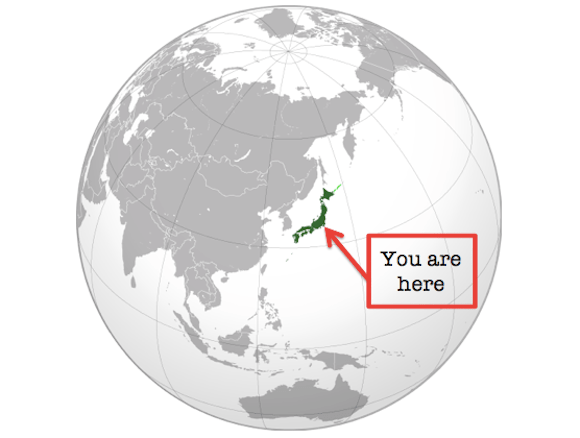Brace yourselves, Republicans and Libertarians: it turns out Japan’s social safety net provides free healthcare to people that need medical attention but have no money or insurance. It’s like Obamacare’s angry, ‘roided-up samurai cousin.
That’s because there’s a somewhat vaguely-worded provision in Japanese law that states the government is obligated to provide care for those with “troubled livelihoods,” at low or no cost, regardless of insurance coverage. “Troubled livelihood” is kind of a broad definition, which ensures that those without the means to pay for medical treatment – even if they aren’t necessarily poor, homeless or unable to work – can still see a doctor.









 Japanese ramen restaurants under pressure from new yen banknotes
Japanese ramen restaurants under pressure from new yen banknotes French Fries Bread in Tokyo’s Shibuya becomes a hit on social media
French Fries Bread in Tokyo’s Shibuya becomes a hit on social media McDonald’s new Happy Meals offer up cute and practical Sanrio lifestyle goods
McDonald’s new Happy Meals offer up cute and practical Sanrio lifestyle goods New private rooms on Tokaido Shinkansen change the way we travel from Tokyo to Kyoto
New private rooms on Tokaido Shinkansen change the way we travel from Tokyo to Kyoto Sakura tree falls on man at Sannenzaka near Kiyomizu temple in Kyoto 【Breaking News】
Sakura tree falls on man at Sannenzaka near Kiyomizu temple in Kyoto 【Breaking News】 Family Mart makes matcha dreams come true with new lineup of strong green tea sweets in Japan
Family Mart makes matcha dreams come true with new lineup of strong green tea sweets in Japan A trip to hell on Japan’s ‘vomit ship’: Is it as bad as everyone says it is?
A trip to hell on Japan’s ‘vomit ship’: Is it as bad as everyone says it is? Cosplay in front of explosions and flames at the upcoming fiery Baku Festival
Cosplay in front of explosions and flames at the upcoming fiery Baku Festival Wendy’s releases a Pretzel Roast Beef Burger aimed at foreign tourists in Japan
Wendy’s releases a Pretzel Roast Beef Burger aimed at foreign tourists in Japan Non-ramen Ramen Restaurant Stars: The quest begins at Tokyo’s Oreryu Shio
Non-ramen Ramen Restaurant Stars: The quest begins at Tokyo’s Oreryu Shio All-you-can-drink Starbucks and amazing views part of Tokyo’s new 170 meter-high sky lounge
All-you-can-drink Starbucks and amazing views part of Tokyo’s new 170 meter-high sky lounge More foreign tourists than ever before in history visited Japan last month
More foreign tourists than ever before in history visited Japan last month Starbucks reopens at Shibuya Scramble Crossing with new look and design concept
Starbucks reopens at Shibuya Scramble Crossing with new look and design concept Studio Ghibli releases new action figures featuring Nausicaä of the Valley of the Wind characters
Studio Ghibli releases new action figures featuring Nausicaä of the Valley of the Wind characters Studio Ghibli glasses cases let anime characters keep an eye on your spectacles
Studio Ghibli glasses cases let anime characters keep an eye on your spectacles Is the new Shinkansen Train Desk ticket worth it?
Is the new Shinkansen Train Desk ticket worth it? Beautiful Ghibli sealing wax kits let you create accessories and elegant letter decorations【Pics】
Beautiful Ghibli sealing wax kits let you create accessories and elegant letter decorations【Pics】 Studio Ghibli releases Kiki’s Delivery Service chocolate cake pouches in Japan
Studio Ghibli releases Kiki’s Delivery Service chocolate cake pouches in Japan New definition of “Japanese whiskey” goes into effect to prevent fakes from fooling overseas buyers
New definition of “Japanese whiskey” goes into effect to prevent fakes from fooling overseas buyers Our Japanese reporter visits Costco in the U.S., finds super American and very Japanese things
Our Japanese reporter visits Costco in the U.S., finds super American and very Japanese things Studio Ghibli unveils Mother’s Day gift set that captures the love in My Neighbour Totoro
Studio Ghibli unveils Mother’s Day gift set that captures the love in My Neighbour Totoro Domino’s Japan now sells…pizza ears?
Domino’s Japan now sells…pizza ears? New Japanese KitKat flavour stars Sanrio characters, including Hello Kitty
New Japanese KitKat flavour stars Sanrio characters, including Hello Kitty New Pokémon cakes let you eat your way through Pikachu and all the Eevee evolutions
New Pokémon cakes let you eat your way through Pikachu and all the Eevee evolutions Sales of Japan’s most convenient train ticket/shopping payment cards suspended indefinitely
Sales of Japan’s most convenient train ticket/shopping payment cards suspended indefinitely Sold-out Studio Ghibli desktop humidifiers are back so Totoro can help you through the dry season
Sold-out Studio Ghibli desktop humidifiers are back so Totoro can help you through the dry season Japanese government to make first change to romanization spelling rules since the 1950s
Japanese government to make first change to romanization spelling rules since the 1950s Ghibli founders Toshio Suzuki and Hayao Miyazaki contribute to Japanese whisky Totoro label design
Ghibli founders Toshio Suzuki and Hayao Miyazaki contribute to Japanese whisky Totoro label design Doraemon found buried at sea as scene from 1993 anime becomes real life【Photos】
Doraemon found buried at sea as scene from 1993 anime becomes real life【Photos】 Tokyo’s most famous Starbucks is closed
Tokyo’s most famous Starbucks is closed One Piece characters’ nationalities revealed, but fans have mixed opinions
One Piece characters’ nationalities revealed, but fans have mixed opinions We asked a Uniqlo employee what four things we should buy and their suggestions didn’t disappoint
We asked a Uniqlo employee what four things we should buy and their suggestions didn’t disappoint Princesses, fruits, and blacksmiths: Study reveals the 30 most unusual family names in Japan
Princesses, fruits, and blacksmiths: Study reveals the 30 most unusual family names in Japan Family Mart makes matcha dreams come true with new lineup of strong green tea sweets in Japan
Family Mart makes matcha dreams come true with new lineup of strong green tea sweets in Japan A trip to hell on Japan’s ‘vomit ship’: Is it as bad as everyone says it is?
A trip to hell on Japan’s ‘vomit ship’: Is it as bad as everyone says it is? Cosplay in front of explosions and flames at the upcoming fiery Baku Festival
Cosplay in front of explosions and flames at the upcoming fiery Baku Festival Wendy’s releases a Pretzel Roast Beef Burger aimed at foreign tourists in Japan
Wendy’s releases a Pretzel Roast Beef Burger aimed at foreign tourists in Japan Non-ramen Ramen Restaurant Stars: The quest begins at Tokyo’s Oreryu Shio
Non-ramen Ramen Restaurant Stars: The quest begins at Tokyo’s Oreryu Shio All-you-can-drink Starbucks and amazing views part of Tokyo’s new 170 meter-high sky lounge
All-you-can-drink Starbucks and amazing views part of Tokyo’s new 170 meter-high sky lounge Beautiful Ghibli sealing wax kits let you create accessories and elegant letter decorations【Pics】
Beautiful Ghibli sealing wax kits let you create accessories and elegant letter decorations【Pics】 Katsudon vs. tonkatsu vs. katsu sandwich – What’s the best way to eat pork cutlet in Japan?
Katsudon vs. tonkatsu vs. katsu sandwich – What’s the best way to eat pork cutlet in Japan? Japan has stopped printing its current yen bills, Mt. Fuji only element to be retained in new set
Japan has stopped printing its current yen bills, Mt. Fuji only element to be retained in new set How much do fans of boys’ love spend every year on homoerotic comics? The amount may surprise you
How much do fans of boys’ love spend every year on homoerotic comics? The amount may surprise you The oldest tunnel in Japan is believed to be haunted, and strange things happen when we go there
The oldest tunnel in Japan is believed to be haunted, and strange things happen when we go there How do fans in Japan feel about the new One Piece Netflix live-action trailer?
How do fans in Japan feel about the new One Piece Netflix live-action trailer? A visit to the best UFO catcher arcade in the universe!
A visit to the best UFO catcher arcade in the universe!